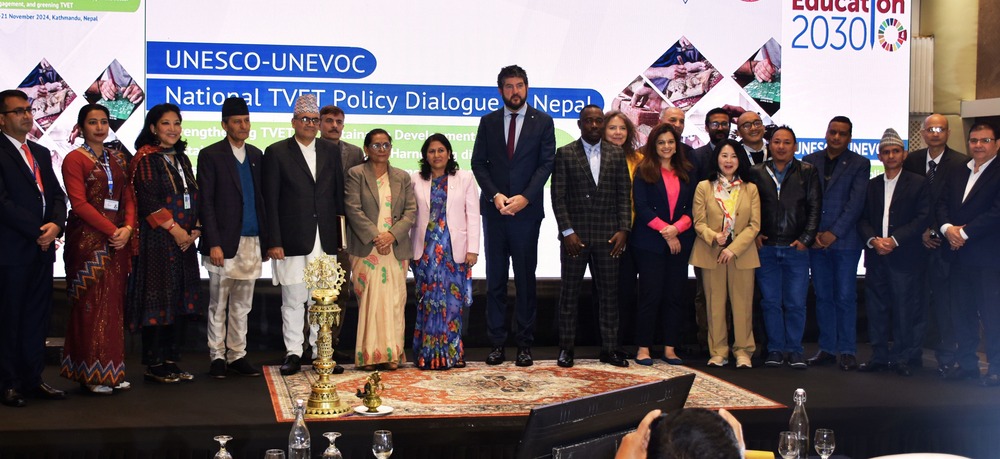
Nov 20, 2024
National TVET Policy Dialogue in Nepal Concluded with Key Policy Recommendations
The National TVET Policy Dialogue in Nepal, jointly organized by the Council for Technical Education and Vocational Training (CTEVT) and UNESCO-UNEVOC in collaboration with the Ministry of Education, Science, and Technology (MoEST), was held from November 20 to 21, 2024, in Lalitpur, Nepal. Centered on the overarching theme of TVET for Sustainable Development, the event featured paper presentations, panel discussions, and group discussions on three key thematic areas: private sector engagement, digital transformation, and greening in TVET.
The program was inaugurated by Honorable Minister of Education, Science, and Technology, Ms. Bidya Bhattarai, and emphasized the government's vision of Prosperous Nepal, Happy Nepali. She underscored the importance of conducting thorough situation analyses before formulating policies and highlighted the critical role of TVET in national development. She stated that the ministry would seriously consider the program's policy recommendations and extended her best wishes for the success of the event. Similarly, Ms. Geeta Kumari Poudyal Adhikari, Honorable Member of the National Planning Commission (NPC), reaffirmed the government's prioritization of TVET and provided updates on the high-level committee tasked with restructuring CTEVT within the federal context. She expressed hope that the dialogue would provide valuable inputs to the committee. In the inaugural session, Dr. Olivier Pieume, Chief of the Technical Cooperation Unit at UNESCO-UNEVOC, introduced the objectives and expected outcomes of the program while presenting UNESCO’s Strategy for TVET (2022–2029). Likewise, Er. Mahesh Bhattarai, Member Secretary of CTEVT, provided an overview of Nepal's TVET landscape and future directions guided by the TVET Sector Strategic Plan (2023–2032).
In the first thematic session, Mr. Naceur Chraiti, former Chief of the UNESCO IIEP Platform of Expertise in TVET, presented international perspectives on private sector involvement in TVET. Dr. Anoj Bhattarai, Executive Director of Training Institute for Technical Instruction (TITI), then provided insights into Nepal’s context. The subsequent panel discussion, chaired by Mr. Ana Prasad Neupane, Joint Secretary of MoEST, featured Er. Birendra Raj Pandey (Vice President, Confederation of Nepalese Industries - CNI), Ms. Vidushi Rana (Executive Director, Goldstar and Haathi), and the national presenter. The session was moderated by Mr. Chraiti and focused on aligning industry needs with TVET initiatives.
Dr. Janaka Jayalath, a senior lecturer at the University of Vocational Technology, Sri Lanka, discussed global trends in digital transformation in TVET in the second thematic session. Complementing this, Mr. Ramesh Sharma Paudyal, Director General of Department of Information Technology (DoIT), Nepal, presented a national perspective. The panel discussion, chaired by Prof. Dr. Rajendra Prasad Adhikari, Chairperson of TITI Managing Board, included Mr. Rom Kant Pandey (Head of ICT Education Department, Tribhuvan University), Mr. Pukar Acharya (Co-Founder and Chief Operating Officer, Sajilo Sewa), and the national presenter. Dr. Jayalath moderated the session, which highlighted the integration of digital technology in TVET programs.
In the third thematic session, Dr. Margarita Pavlova, Associate Professor and UNEVOC Coordinator at The Education University of Hong Kong, presented international perspectives on greening in TVET. Er. Saurav Ram Joshi from the ILO Country Office for Nepal followed with an analysis of Nepal’s greening initiatives in TVET. The panel discussion, chaired by Dr. Dinesh Chandra Devkota, Honorable Member of the Bagmati Provincial Assembly, featured Prof. Dr. Sangeeta Singh (Institute of Engineering, Tribhuvan University), Ms. Abhigya Malla (Managing Director, Union Hydropower Ltd. and High Himalaya Hydro Construction Ltd.), and the national presenter. Dr. Pavlova moderated the discussion, focusing on greening practices within TVET.
Afterwards, the participants were divided into three thematic groups to identify challenges and propose policy recommendations. This was followed by a presentation by Mr. Ana Prasad Neupane, Joint Secretary from MoEST, on restructuring TVET within Nepal’s federal context, which also sparked a robust discussion. Dr. Olivier Pieume then concluded all the sessions by summarizing the outcomes and outlining the next steps.
In the closing remarks, Mr. Michael Croft, UNESCO’s Representative to Nepal, thanked the organizers and reaffirmed UNESCO’s commitment to supporting Nepal’s TVET initiatives. Joining virtually, Prof. Dr. Shiva Raj Adhikari, Honorable Vice Chairperson of the National Planning Commission (NPC), appreciated the dialogue's contributions and showed commitment for strengthening TVET in Nepal. Er. Mahesh Bhattarai thanked all experts, speakers and participants for their valuable inputs and contributions. He emphasized the importance of collaborative efforts to advance the TVET sector in Nepal.
The event was attended by representatives from MoEST, other federal ministries, provincial governments, local governments, development partners, universities, business and industry sectors, sector skill committees (SSCs), and TVET institutes, with over 80 participants contributing to the discussions. The dialogue concluded with actionable policy recommendations on private sector engagement, digital transformation, and greening in TVET, aimed at supporting the government in policy formulation and implementation to strengthen TVET in Nepal.

